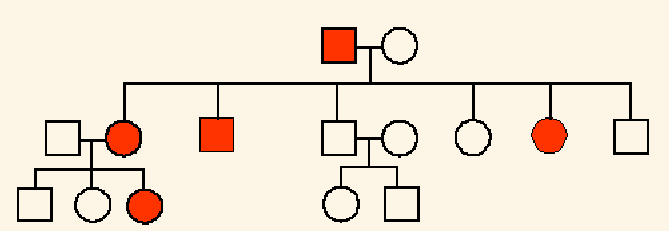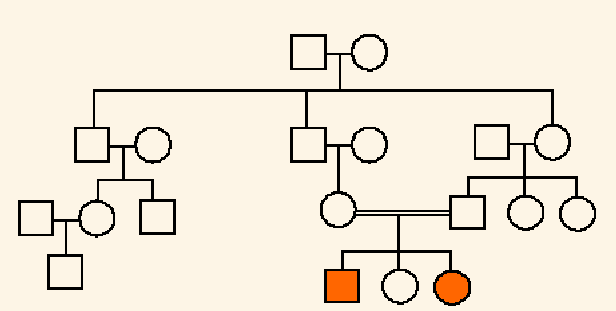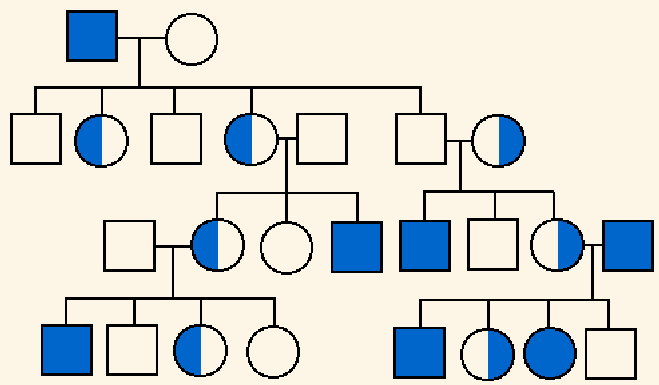I need help with the attached labs projects.
Pedigree Worksheet Name ____________________________________
= Huntington’s
Disease

I
1 2
II 1 2 4 5
3 6 7 8
III
1 2 3 4 5
1. Which members of the family above are afflicted with Huntington’s Disease? _________________________________
2. There are no carriers for Huntington’s Disease- you either have it or you don’t.
With this in mind, is Huntington’s disease caused by a dominant or recessive trait? ____________________________
3. How many children did individuals I-1 and I-2 have? _______________________________________________
4. How many girls did II-1 and II-2 have? ______________ How many have Huntington’s Disease? ________________
5. How are individuals III-2 and II-4 related? ________________________ I-2 and III-5? _________________________
6. The pedigree to the right shows a family’s pedigree
for Hitchhiker’s Thumb. Is this trait
dominant or recessive? _______________________
I
1
2
7. How do you know? _________________________
___________________________________________
II
8. How are individuals III-1
2
1
4
3
and III-2 related? ________________________
III
9. How would you name the 2 individuals that
4
3
2
1
have hitchhiker’s thumb? ___________________
IV
10. Name the 2 individuals that were
3
2
1
carriers of hitchhiker’s thumb. ______________
11. Is it possible for individual IV-2 to be a carrier? ___________ Why? ________________________________________
12. The pedigree to the right shows a family’s pedigree

**half-shaded = carrier of disease
I
for colorblindness. Which sex can be carriers of
colorblindness and not have it? ______________________
13. With this in mind, what kind of trait is
II
colorblindness (use your notes)? ______________________
14. Why does individual IV-7 have colorblindness?
_________________________________________________
III
15. Why do all the daughters in generation II carry the
colorblind gene? ____________________________________
IV
16. Name 2 IV generation colorblind males. _________
8
7
6
5
4
1
2
3
Name ____________________________________
Genetics Pedigree Worksheet
A pedigree is a chart of a person’s ancestors that is used to analyze genetic inheritance of certain traits – especially diseases. The symbols used for a pedigree are:
female, unaffected
female, affected
male, unaffected
male, affected
Siblings are placed in birth order from left to right and are labeled with numbers.
Each generation is labeled with a Roman numeral.
Example: we would name an individual II-3 if he/she was in the second generation and the 3rd child born
- - - - - - - - - - - - - - - - - - - - - - - - - - - - - - - - - - - - - - - - - - - - - - - - - - - - - - - - - - - - - - - - - - - - - - - - - - - - - -
I
1 2 3 4 5 6
II
1 2 3 4 5 6 7 8 9
III
1 2 3 4 5 6 7 8
Try to identify the genotypes of the following individuals using the pedigree above.
(homozygous dominant, homozygous recessive, heterozygous)
III-3: ___________________________________
II-1: ____________________________________
I-1: ____________________________________
II-4: ____________________________________
1. Is this trait dominant or recessive? Explain your answer.
_________________________________________________________________________________________________________________________________________________________________________________________________________________________________________________________________________________
2. How can you know for sure that individuals II-3 and II-4 are heterozygous?
______________________________________________________________________________________________________________________________________________________________________________________
3. Brown eyes are a dominant eye-color allele and blue eyes are recessive. A brown-eyed woman whose father had blue eyes and whose mother had brown eyes marries a brown-eyed man whose parents are also brown-eyed. They have a son who is blue-eyed. Please draw a pedigree showing all four grandparents, the two parents, and the son. Indicate which individuals you are certain of their genotype and where there are more than one possibilities.



